By Richard Valdmanis
WASHINGTON (Reuters) - U.S. Energy Secretary Rick Perry said on Thursday that bailing out struggling coal and nuclear power plants is as important to national security as keeping the military strong, and that the cost to Americans should not be an issue.
"You cannot put a dollar figure on the cost to keep America free," he told reporters at a press conference in Washington, when asked about the administration's effort to extend the lives of the facilities. When asked about the cost of a potential bailout, he said he did not yet know.
"We look at the electricity grid as every bit as important to (national security) as making sure we have the right number of ships, aircraft and personnel," he said. "What is your freedom worth?"
President Donald Trump ordered the Department of Energy (DOE) to take emergency measures to slow the retirements of coal and nuclear power plants, arguing those kinds of facilities can store months of fuel on site and therefore withstand supply disruptions that could be caused by storms, hacks, or physical attacks.
The effort fits neatly with the administration's broader agenda to boost U.S. fossil fuels production and to save the coal industry, but has been criticized by an unusual alliance of drillers, renewable energy advocates, environmentalists, regulators and grid operators who say it is unnecessary and unfair.
Aging coal and nuclear facilities have been shuttering at a rapid pace in recent years, pushed out by cheaper natural gas as well as renewable energy sources like wind and solar - a driving factor in declining U.S. emissions of greenhouse gases.
The Trump administration considers natural gas and renewable energy vulnerable, however, because gas-fired plants rely on pipelines that can be disrupted, and solar and wind facilities only produce energy under certain weather conditions.
Perry pointed out that nearly all U.S. military bases rely on power from the civilian grid.
The DOE is currently studying ways to bail out coal and nuclear facilities, including potentially by mandating grid operators to purchase power from them.
Perry said the DOE is examining the costs now.
Federal energy regulators rejected a previous effort by Perry to require them to subsidize nuclear and coal plants for providing "resilience" to the grid.
That did not stop the coal industry from making new requests for help from the administration. In late March, FirstEnergy's (N:FE) FirstEnergy Solutions unit - which runs coal and nuclear power units - called on the U.S. energy secretary to use the emergency powers to lift the sectors.

Coal company CEO Robert Murray of Murray Energy, also called for Perry to use emergency powers to save at-risk coal plants.
